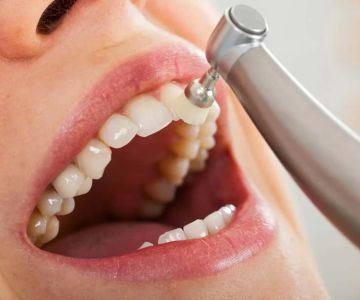The Importance of Flossing Daily
When it comes to maintaining a healthy smile, brushing your teeth is only half of the equation. You may have heard time and time again that flossing is just as important, but have you ever wondered why? Flossing daily is a simple yet powerful habit that can greatly improve your oral health and prevent a range of dental problems. In this article, we'll delve into the importance of flossing daily and provide helpful tips to make it a regular part of your routine.
1. Prevents Tooth Decay Between Teeth
One of the primary benefits of flossing daily is that it helps remove plaque and food particles that your toothbrush can't reach. While brushing is effective at cleaning the surfaces of your teeth, it’s not always enough to get into the tight spaces between them. This is where flossing comes in. The thin, flexible floss is designed to slide between teeth and remove debris, helping to prevent cavities in areas that are often overlooked.
Studies have shown that regular flossing can significantly reduce the build-up of plaque between teeth, reducing your risk of cavities and tooth decay. In fact, research indicates that the majority of cavities form between teeth, where food particles can sit for extended periods of time. Flossing ensures that these particles are removed, promoting overall oral health.
2. Reduces Gum Disease
Another crucial benefit of daily flossing is its role in preventing gum disease. Plaque that accumulates along the gumline can cause inflammation, leading to gingivitis, the early stage of gum disease. Gingivitis causes red, swollen gums that may bleed when you brush or floss. If left untreated, gingivitis can progress to periodontitis, a more severe form of gum disease that can result in tooth loss.
By flossing regularly, you help reduce plaque build-up along the gumline, lowering your chances of developing gum disease. In fact, research has found that flossing combined with regular brushing can reduce the risk of gum disease by up to 40%. This simple act of flossing every day can help maintain your gum health and keep your smile intact.
3. Helps Prevent Bad Breath
Bad breath, or halitosis, is often caused by food particles and bacteria trapped between your teeth. When food particles remain in your mouth, they begin to break down and release unpleasant odors. This is particularly true for sugary or starchy foods, which bacteria thrive on. Flossing can help remove these particles, reducing the bacteria that cause bad breath and leaving your mouth feeling fresh.
Flossing is especially important after meals, as it clears away any lingering food that might contribute to foul smells. If you're concerned about bad breath, adding flossing to your daily routine can make a noticeable difference in how your breath smells throughout the day.
4. Saves You Money in the Long Run
While it may seem like an added expense to buy floss and take a few minutes each day to floss, the long-term savings are significant. By preventing tooth decay and gum disease, you reduce your chances of needing expensive dental procedures like fillings, crowns, or root canals. These treatments can cost hundreds or even thousands of dollars, depending on the severity of the issue.
Moreover, maintaining good oral hygiene with regular flossing can help prevent the need for costly treatments in the future. Investing just a few minutes of your day in flossing can save you a considerable amount of money over time by avoiding dental issues that require extensive care.
5. Improves Overall Health
Believe it or not, flossing doesn't just benefit your teeth and gums; it can also improve your overall health. Poor oral health has been linked to several serious health conditions, including heart disease, diabetes, and stroke. The bacteria from gum disease can enter your bloodstream, increasing inflammation and contributing to these chronic health problems.
Flossing daily can help reduce the bacteria in your mouth, lowering your risk of developing these health issues. In fact, studies have found that people who floss regularly have a lower risk of heart disease and diabetes, as they maintain better oral hygiene and reduce the amount of harmful bacteria in their bodies.
6. How to Floss Properly
Now that you understand the importance of flossing, it's essential to know how to do it correctly. Improper flossing can cause damage to your gums or teeth, so it’s crucial to follow the right technique. Here's a step-by-step guide:
- Cut a piece of floss about 18 inches long. Wind most of the floss around your middle fingers, leaving about 2 inches to work with.
- Hold the floss tightly between your thumbs and index fingers and gently slide it between your teeth.
- Curve the floss around each tooth in a “C” shape and gently move it up and down along the sides of the tooth.
- Be sure to clean both sides of each tooth, including the area where the tooth meets the gumline.
- Use a clean section of floss for each tooth to avoid transferring bacteria between teeth.







 Westgate Dental Arts
Westgate Dental Arts Coventry Family Dental
Coventry Family Dental Familia Dental
Familia Dental Dr. Daniel S. Fife, DDS
Dr. Daniel S. Fife, DDS Dentistry At Suburban Square: Michael I. Wollock, DMD
Dentistry At Suburban Square: Michael I. Wollock, DMD Comfort Care Dental
Comfort Care Dental The Importance of Oral Health Education During Pregnancy for a Healthy Pregnancy
The Importance of Oral Health Education During Pregnancy for a Healthy Pregnancy Why Skipping Dental Checkups Can Lead to Bigger Oral Health Problems
Why Skipping Dental Checkups Can Lead to Bigger Oral Health Problems Advantages of Porcelain Dental Restorations
Advantages of Porcelain Dental Restorations Best Tips for Brushing Your Teeth Properly for Healthy Gums: Essential Techniques for Oral Health
Best Tips for Brushing Your Teeth Properly for Healthy Gums: Essential Techniques for Oral Health How Can Diabetes Cause Tooth and Gum Problems? Preventing and Managing Oral Health Issues
How Can Diabetes Cause Tooth and Gum Problems? Preventing and Managing Oral Health Issues Healthy Habits for Promoting Good Oral Health and Hygiene: Tips for a Healthy Smile
Healthy Habits for Promoting Good Oral Health and Hygiene: Tips for a Healthy Smile